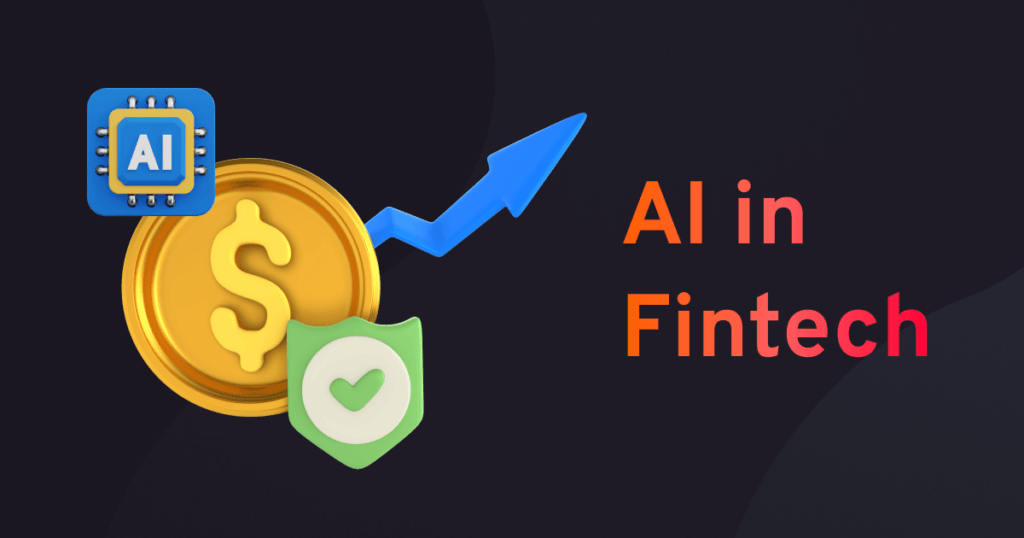Role of AI in Fintech: Benefits and Use Cases
Artificial Intelligence is projected to reach a monumental valuation of 49 billion by 2028, according to Globe News Wire. AI in Fintech stands on the brink of an unprecedented technological evolution. Transitioning from a once futuristic notion to the cornerstone of innovation, AI in Fintech companies is reshaping customer service, streamlining payment processes, and enhancing the efficiency and growth of financial services.
This shift towards digitalization underscores the important role of Artificial Intelligence technologies, including Generative AI and large language models in banking, marking them as the core drivers of a transformative era in finance.

The effervescent impact of Artificial Intelligence doesn’t stop at mere figures; it permeates the entire fabric of the financial sector by enhancing customer service metrics such as CSAT and operational efficiency, at a scale that is rapidly reshaping the industry. Leveraging Generative AI in Banking radiates through various components of financial operations, from credit risk management and assessment to personalized banking experiences, carving out a crucible of innovation that stands to redefine the competitive landscape of the global economy.
What does AI Mean to Fintech Exactly?
The convergence of Artificial Intelligence (AI) and financial technology (Fintech) represents a dynamic sector at the forefront of disruptive innovation in financial services. By leveraging AI-powered systems, Fintech companies are reshaping customer expectations and ushering in a new era of personalized, accessible, and efficient financial operations. Here we decode the essence and impact of AI-driven Fintech solutions.
AI in Fintech is characterized by the implementation of machine learning, natural language processing, predictive analytics, and cognitive computing to empower financial institutions. These technologies analyze customer data to make data-driven decision-making, improve regulatory compliance, and enhance overall customer experiences. From enterprise chatbots that handle customer inquiries to algorithms that predict creditworthiness, Artificial Intelligence is rapidly becoming the backbone of next-generation fintech companies.
| AI Application | Benefits in Fintech |
|---|---|
| Payment Processing Automation | Reduces errors, speeds up transactions, and lowers operational costs. |
| Credit Scoring Algorithms | Provides more accurate risk assessments and offers greater financial inclusion. |
| Fraud Detection Systems | Leverages pattern recognition to identify and prevent fraudulent activities. |
| Customer Service Bots | Delivers 24/7 customer service and support, enhancing client satisfaction. |
To visualize the remarkable alteration in the financial landscape, consider how using Conversational AI in Banking like Bank of America’s ‘Erica’ has revolutionized customer interactions, making them more responsive and personalized than ever before. Similarly, fraud detection and prevention have become more robust with AI’s predictive capabilities, safeguarding against cyber threats with unprecedented efficiency.
Ultimately, Artificial Intelligence isn’t just an auxiliary technology in the Fintech industry; it’s a central pillar that embodies the trajectory of modern financial innovation. As AI continues to interweave with Fintech companies, its role in driving industry advancements, enhancing security, and optimizing operational efficiency cannot be understated.

The Role of AI in Financial Sector
Understanding how AI is used in FinTech reveals how deeply it entwines the core operations of financial services to amplify efficiency and drive AI in financial services revenue. Within this dynamic landscape, AI’s capability to transform how customers engage with financial services plays a pivotal role. To illustrate the profound impact of Artificial Intelligence on financial service providers, we see a broad adoption of various technologies designed to enhance the customer experience, reduce costs, and increase overall business efficiency.
AI-driven customer-centric solutions such as personalized financial advice and AI assistants enable continuous and streamlined customer interactions. The role of AI in financial companies extends beyond convenience, ensuring that customer engagement remains both circumspect and meaningful. This technological advancement allows financial services to meet the evolving needs of customers, ensuring customer loyalty and fostering a competitive edge in a crowded marketplace.
Cost savings is another facet of AI in finance, wherein smart automation takes on repetitive tasks. This strategic displacement allows human capital to focus on complex and creative tasks, generating more value for the institution and its clientele. We observe this in the form of AI-driven analytics, which supports real-time decision-making and enhances business intelligence, again underlining the synergy between Artificial Intelligence and revenue growth in financial services.
Moreover, Artificial Intelligence constitutes a critical component in fortifying the security framework of financial institutions. Advanced AI algorithms enable improved monitoring and detection of fraudulent activity, safeguarding both the customer and the institution. These sophisticated systems are constantly learning and adapting to new threats, ensuring a robust defense against ever-evolving cyber risks.
While the integration of AI has undeniably elevated the caliber of financial services, continuous innovation, and thoughtful implementation remain key to harnessing its full potential. A harmonious blend of AI and human expertise is essential for enabling financial institutions to not only survive but thrive in the digital age and deliver a magical customer experience.
8 Ways AI is Transforming Fintech Companies
The evolution of the AI in FinTech market has been nothing short of remarkable, with FinTech companies harnessing the power of Artificial Intelligence to redefine the landscape of financial services. As we delve into the ways Artificial Intelligence is altering the sector, it is clear that AI-driven decision-making and AI in risk management play pivotal roles. Below are the key transformations ushered in by this groundbreaking technology.
AI-Enhanced Customer Service
AI-powered customer service, exemplified by enterprise intelligent virtual assistants such as AiseraGPT, represents a significant leap in how financial institutions interact with their customers. These AI-powered chatbots utilize Conversational AI to offer immediate, personalized support, making financial advice and assistance more accessible than ever. Beyond handling routine inquiries, these AI systems can perform complex tasks such as facilitating transactions or providing tailored financial advice, transforming customer service from a cost center into a value-added service. This not only improves customer satisfaction but also allows human agents to focus on more complex issues, optimizing workforce efficiency.
Improved Cybersecurity Measures
In the domain of cybersecurity, AI algorithms play a critical role in developing sophisticated anti-fraud systems. These systems analyze transaction patterns in real time to detect anomalies that may indicate fraudulent activity, enabling preemptive action to prevent financial loss. By constantly learning from new data, AI models adapt to evolving fraud tactics, ensuring financial institutions stay ahead of cybercriminals. This proactive approach to security not only protects assets but also builds trust with customers, crucial for maintaining a strong market position.
Predictive Analytics for Market Trends
Predictive analytics harness AI’s power to process vast datasets and forecast future market trends. FinTech firms leverage this capability to anticipate shifts in consumer behavior, market demand, and economic conditions, allowing them to make informed strategic decisions. This foresight can lead to the development of innovative financial products, targeted marketing strategies, and optimized investment portfolios, thereby enhancing competitiveness and profitability.
Enhanced Credit Scoring Models
AI has revolutionized credit scoring by enabling more nuanced and dynamic assessments of credit risk. Unlike traditional models, AI-driven systems can analyze a broader range of data points, including non-traditional data such as social media activity or mobile phone usage patterns, to predict an applicant’s creditworthiness. This leads to more accurate credit scores, expands financial inclusion by providing credit access to underserved segments, and reduces the risk of default for lenders.
Effective Fraud Detection Strategies
AI’s integration into fraud detection mechanisms significantly enhances banking security. By employing machine learning algorithms that can detect patterns indicative of fraudulent activity, financial institutions can identify and mitigate risks much more efficiently than traditional methods. This capability is particularly valuable in real-time transaction processing, where speed and accuracy are critical for preventing unauthorized transactions and minimizing financial losses.
User Behavior Analysis
AI techniques for analyzing user behavior are transforming the personalization of financial products and services. By understanding customers’ spending habits, investment preferences, and interaction patterns, financial institutions can tailor their offerings to meet individual needs. This deep level of personalization not only improves customer satisfaction and loyalty but also opens new revenue streams by identifying and addressing unmet financial needs.
Automated Financial Advisors
AI-powered chatbots and robo-advisors are redefining personal finance by providing customized investment advice based on individual risk profiles and financial goals. These systems can manage portfolios, suggest investment strategies, and even execute trades, offering a level of convenience and accessibility previously available only to high-net-worth individuals. By democratizing financial advice, automated advisors are broadening the market for investment services and enhancing financial literacy among the general public.
Data-Driven Strategic Planning
The capacity of AI for extensive data analysis is crucial for long-term strategic planning and policy development in financial institutions. By aggregating and analyzing data from various sources, AI can uncover insights into market trends, operational inefficiencies, and customer preferences, informing strategic decisions that drive growth and innovation. This data-driven approach allows financial institutions to adapt more quickly to market changes, optimize operations, and deliver superior value to customers and stakeholders.
These advancements showcase the remarkable strides made by AI in revolutionizing operations, decision-making processes, analyzing customer data, and client interactions within the Fintech sector.
| AI Application | Impact on Fintech |
|---|---|
| Chatbots and Personal Assistants | Increased customer engagement and round-the-clock service |
| Risk Management and Credit Scoring | Enhanced accuracy in credit evaluation and underwriting |
| AI in Fraud Detection | Improved prevention of fraudulent activities and financial loss |
| Data Analysis and Forecasting | Detailed insights leading to strategic business growth and profit maximization |
The aforementioned strides are not exhaustive but represent a glimpse into an AI-integrated future, where financial technologies continue to evolve at an accelerated pace. The interplay between AI and the financial industry hints at an era where efficiency, security, and innovation are paramount.
Real-World Examples of Using AI in Financial Technology
The integration of AI in Fintech solutions has not only been theoretical but also abundantly evident in real-world scenarios. Enterprises in the financial technology sector have been aligning their strategic direction to incorporate real-world AI implementation in the Fintech industry, which has led to innovations that are transforming the financial industry forward.
One of the most discernible examples of AI deployment is in the realm of customer experience, where chatbots such as Bank of America’s Erica have changed the face of customer interaction within the banking setting. These AI-driven systems provide users with proactive alerts, account balance information, and support on financial queries, simulating human-like conversations and reducing the need for human intervention from customer service agents.
Artificial Intelligence has also made substantial inroads in credit underwriting, with machine learning models providing improved credit scoring systems. These AI-powered solutions process and analyze vast amounts of data to assess creditworthiness, expediting the loan approval process with greater accuracy and less bias.
Further exemplifying the impact of AI, fraud detection within Fintech has reached new heights. Advanced algorithms analyze patterns in credit history and spending behavior to identify and prevent fraudulent activities swiftly, therefore safeguarding customer assets with a once inconceivable precision.
| AI Application | Use Case | Benefits |
|---|---|---|
| AI-Enhanced Chatbots | Customer Service & Support | 24/7 assistance, reduction in operational costs, personalized communication |
| Machine Learning Credit Scoring | Credit Underwriting | Faster processing, increased accuracy, reduced bias |
| Pattern Recognition Algorithms | Fraud Detection | Real-time identification, behavior analysis, minimized financial losses |
These instances are not exhaustive but highlight the potential and current applications of AI in Fintech solutions, fostering trust and efficiency in financial transactions. It is these real-life applications that testify to the invaluable role Artificial Intelligence is playing in reshaping the financial landscape.

Challenges and Limitations of Using AI in Fintech
The integration of artificial intelligence into the financial sector, commonly referred to as Fintech, has been a quantum leap forward for the industry. However, the road ahead is pocked with significant challenges and limitations that must be addressed.
One of the primary challenges of leveraging Artificial Intelligence in Fintech is the heavy reliance on large datasets, which raises substantial concerns over TRAPS with data privacy and security. Trust in Artificial Intelligence systems is paramount, particularly in finance, where sensitive data is omnipresent.
The inherent sophistication of financial markets demands AI algorithms that are not just powerful but also transparent and explainable. Users and regulators alike are calling for systems that can be easily understood and trusted.
| Challenge | Impact | Potential Solutions |
|---|---|---|
| Data Privacy and Security | Increased risk of data breaches and misuse | Implementation of robust cybersecurity measures and privacy laws compliance |
| Explainability of AI Systems | Difficulty in earning user trust without transparency | Development of transparent algorithms and explainable AI models |
| Adaptability to Evolving Threats | Keeping pace with sophisticated cyber threats is challenging | Continual learning models that adapt and evolve |
In conclusion, as AI continues to reshape the financial services landscape, stakeholders must proceed with caution, ever-mindful of the limitations of AI in Fintech. Investments in cybersecurity, ethical AI, and ongoing algorithm improvements will be essential to overcoming the challenges ahead.
The Future of Fintech with AI
As we look forward to the future of AI in the financial sector, we see a powerful blend of technology and finance, carving a pioneering path for the financial industry. By 2028, AI in financial services is poised to hit a market value of $49 billion, showcasing its crucial role in fostering growth and innovation within the sector. AI’s impact is recognized not as a fleeting moment but as a core transformation in the operational portfolio management, analytical, and engagement processes of financial institutions.
Transforming Customer Interactions and Lending Practices
The introduction of AI into FinTech innovation is leading institutions towards smarter operational models. Key advancements include:
- Intelligent Chatbots: Redefining customer service with efficient, scalable interactions.
- AI-Powered Credit Scoring: Revolutionizing lending with more accurate risk assessments.
Advancements in Predictive Analytics and Task Automation
AI’s capabilities extend into:
- Predictive Analytics: Offering deeper insights into future market trends and customer behaviors.
- Task Automation: Streamlining complex operations, thus freeing up human resources for strategic work.
Enhancing Personalization and Data Analysis
Further contributions of AI include:
- Personalized Customer Experiences: Leveraging deep learning and natural language processing for tailored services.
- Data-Driven Decisions: Utilizing AI to manage and interpret vast amounts of data for strategic planning.
AI: The Backbone of Modern Fintech
AI’s integration into Fintech not only transforms the financial landscape but also establishes itself as the sector’s foundation, promoting resilience, adaptability, and a focus on efficiency, inclusivity, and customer satisfaction.
Digital Transformation and Financial Industry Evolution
In this era of digital transformation, the synergy between AI and Fintech highlights a path of innovation, influencing how operations are streamlined, costs are reduced, and customer experiences are enhanced. This marks a significant and lasting impact on the global financial services ecosystem, steering it towards a future defined by efficiency and customer-centricity. You can book an AI Demo for leveraging AI and automation in banking and financial services today.
